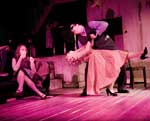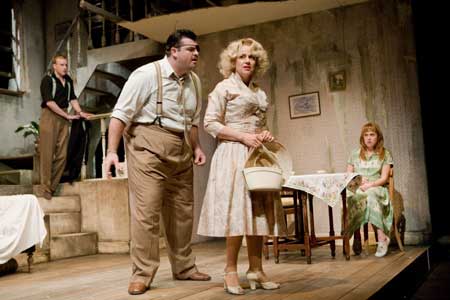Review: A Taste of Honey
Mark Powell’s production of A Taste of Honey for Salisbury Playhouse goes back to basics


The first thing that will strike anyone who has never seen Shelagh Delaney's A Taste of Honey (1958) on stage before is the utterly extraordinary quality of the dialogue and the fine detailing of the characterisation. It seems semi-miraculous that a 17-year-old girl from Manchester, who left Secondary Modern school the year before to work as an usherette, could produce such a taut, witty and wise piece of work.
Admittedly, Joan Littlewood at the Theatre Royal, Stratford, where the play was premiered, edited and primped the piece, bringing out its Lancashire music-hall qualities (as T. S. Eliot noted, ‘Lancashire wit is mordant, ferocious and personal’). But this still surely stands as one of the best pieces of theatre ever produced by a teenager, and one of the most closely observed examples of social realism by a writer of any vintage. Little wonder it inspired a succeeding generation of playwrights, as well as film-makers, including Tony Richardson (who made the equally extraordinary 1961 film of the play in collaboration with Miss Delaney herself) and lyricists such as Morrissey, whose early work is peppered with lines from the play.

Mark Powell’s production for Salisbury Playhouse goes back to basics in that it incorporates the jazz trio of the original production, interpolating numerous music-hall numbers, and resuscitates Littlewood’s convention of having characters speak directly at the audience, vaudeville style. The jaunty, even cheeky tone will come as a surprise to those familiar with the film, with the heroine’s vampish mother, Helen, delivering deadpan lines such as (on looking in the mirror): ‘Every line tells a dirty story.’
This production takes some time to find its feet. The interaction between the heroine Jo and her mother in their filthy flat seems stilted and unsure in the opening scenes. Things liven up with the appearance of Peter, Helen’s odious fancy man, but only after the interval does it really take off. As one theatregoer remarked on leaving: ‘It’s as if it were two different plays.’
The catalyst is probably Rob Delaney playing Geof, Jo’s gay friend, who moves in and looks after her when her black sailor boyfriend deserts her having made her pregnant. Some of the frankly over-ambitious musical numbers are simply beyond the vocal reach of the other performers—only Mr Delaney (in his professional debut) seems truly comfortable in a song-and-dance routine.
Sarah Ridgeway as Jo grows in confidence and stature as the play develops, and, by the final scene, she imbues her character with the unassuming yet profound dignity envisaged by Delaney. Helen Sheals as Helen also improves in her role, but one senses that the cast still needs convincing of the brilliance of the scripted dialogue. This is a production that will certainly improve with age.
To October 25. Box office: 01722 320333
Sign up for the Country Life Newsletter
Exquisite houses, the beauty of Nature, and how to get the most from your life, straight to your inbox.
Country Life is unlike any other magazine: the only glossy weekly on the newsstand and the only magazine that has been guest-edited by HRH The King not once, but twice. It is a celebration of modern rural life and all its diverse joys and pleasures — that was first published in Queen Victoria's Diamond Jubilee year. Our eclectic mixture of witty and informative content — from the most up-to-date property news and commentary and a coveted glimpse inside some of the UK's best houses and gardens, to gardening, the arts and interior design, written by experts in their field — still cannot be found in print or online, anywhere else.
-
 380 acres and 90 bedrooms on the £25m private island being sold by one of Britain's top music producers
380 acres and 90 bedrooms on the £25m private island being sold by one of Britain's top music producersStormzy, Rihanna and the Rolling Stones are just a part of the story at Osea Island, a dot on the map in the seas off Essex.
By Lotte Brundle
-
 'A delicious chance to step back in time and bask in the best of Britain': An insider's guide to The Season
'A delicious chance to step back in time and bask in the best of Britain': An insider's guide to The SeasonHere's how to navigate this summer's top events in style, from those who know best.
By Madeleine Silver